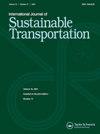Carbon neutrality in transportation: In the context of renewable sources
IF 3.1
3区 工程技术
Q2 ENVIRONMENTAL STUDIES
International Journal of Sustainable Transportation
Pub Date : 2025-01-02
DOI:10.1080/15568318.2024.2447999
引用次数: 0
Abstract
GHGs significantly impact climate change, adversely affecting both the environment and human well-being. As energy production and transportation are among the primary contributors to these emissions, many nations have implemented strategies to transition to renewable energy and reduce emissions by 2050-2070. This review focuses on identifying effective policies and pathways to achieve carbon neutrality in the transport supply chain. A bibliometric analysis highlights the growing importance of hydrogen and biomass-generated energy. Key trends include alternative fuels, hydrogen, electric vehicles, solar and wind energy, carbon neutrality, and GHG mitigation. In both the short and long term, integrating green transportation innovations, renewable energy consumption, and sustainable economic growth can substantially lower carbon emissions. Factors such as population growth, urbanization rates, coal consumption, renewable energy adoption, and the increasing use of electric vehicles (EVs) are emerging as critical drivers of environmental sustainability and net-zero emission goals. Policymakers are strongly encouraged to prioritize and implement optimal strategies that capitalize on these opportunities to advance carbon neutrality objectives.
交通运输中的碳中和:在可再生能源的背景下
温室气体对气候变化产生重大影响,对环境和人类福祉产生不利影响。由于能源生产和运输是这些排放的主要来源之一,许多国家已经实施了向可再生能源过渡的战略,并在2050-2070年之前减少排放。本综述的重点是确定在运输供应链中实现碳中和的有效政策和途径。一项文献计量分析强调了氢和生物质能日益增长的重要性。主要趋势包括替代燃料、氢、电动汽车、太阳能和风能、碳中和和温室气体减排。从短期和长期来看,将绿色交通创新、可再生能源消费和可持续经济增长相结合,可以大幅降低碳排放。人口增长、城市化率、煤炭消费、可再生能源采用和电动汽车(ev)使用增加等因素正在成为环境可持续性和净零排放目标的关键驱动因素。强烈鼓励政策制定者优先考虑并实施利用这些机会推进碳中和目标的最佳战略。
本文章由计算机程序翻译,如有差异,请以英文原文为准。
求助全文
约1分钟内获得全文
求助全文
来源期刊
CiteScore
8.90
自引率
2.60%
发文量
56
期刊介绍:
The International Journal of Sustainable Transportation provides a discussion forum for the exchange of new and innovative ideas on sustainable transportation research in the context of environmental, economical, social, and engineering aspects, as well as current and future interactions of transportation systems and other urban subsystems. The scope includes the examination of overall sustainability of any transportation system, including its infrastructure, vehicle, operation, and maintenance; the integration of social science disciplines, engineering, and information technology with transportation; the understanding of the comparative aspects of different transportation systems from a global perspective; qualitative and quantitative transportation studies; and case studies, surveys, and expository papers in an international or local context. Equal emphasis is placed on the problems of sustainable transportation that are associated with passenger and freight transportation modes in both industrialized and non-industrialized areas. All submitted manuscripts are subject to initial evaluation by the Editors and, if found suitable for further consideration, to peer review by independent, anonymous expert reviewers. All peer review is single-blind. Submissions are made online via ScholarOne Manuscripts.

 求助内容:
求助内容: 应助结果提醒方式:
应助结果提醒方式:


